联合国国家及其财产管辖豁免公约
- 格式:doc
- 大小:33.00 KB
- 文档页数:3
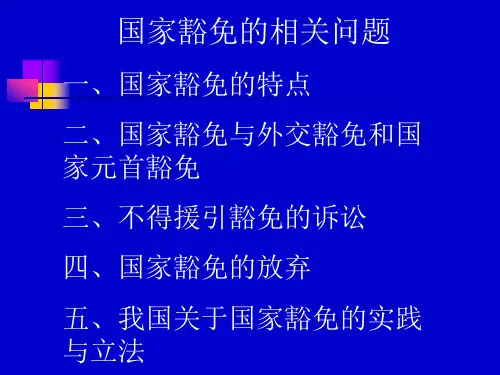
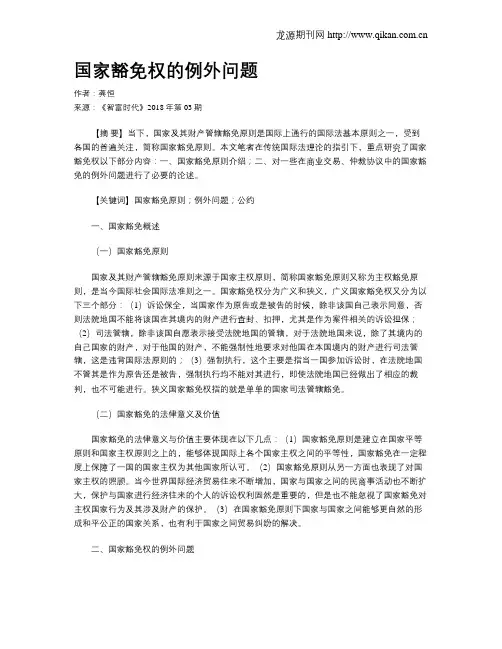
国家豁免权的例外问题作者:龚恒来源:《智富时代》2018年第03期【摘要】当下,国家及其财产管辖豁免原则是国际上通行的国际法基本原则之一,受到各国的普遍关注,简称国家豁免原则。
本文笔者在传统国际法理论的指引下,重点研究了国家豁免权以下部分内容:一、国家豁免原则介绍;二、对一些在商业交易、仲裁协议中的国家豁免的例外问题进行了必要的论述。
【关键词】国家豁免原则;例外问题;公约一、国家豁免概述(一)国家豁免原则国家及其财产管辖豁免原则来源于国家主权原则,简称国家豁免原则又称为主权豁免原则,是当今国际社会国际法准则之一。
国家豁免权分为广义和狭义,广义国家豁免权又分为以下三个部分:(1)诉讼保全,当国家作为原告或是被告的时候,除非该国自己表示同意,否则法院地国不能将该国在其境内的财产进行查封、扣押,尤其是作为案件相关的诉讼担保;(2)司法管辖,除非该国自愿表示接受法院地国的管辖,对于法院地国来说,除了其境内的自己国家的财产,对于他国的财产,不能强制性地要求对他国在本国境内的财产进行司法管辖,这是违背国际法原则的;(3)强制执行,这个主要是指当一国参加诉讼时,在法院地国不管其是作为原告还是被告,强制执行均不能对其进行,即使法院地国已经做出了相应的裁判,也不可能进行。
狭义国家豁免权指的就是单单的国家司法管辖豁免。
(二)国家豁免的法律意义及价值国家豁免的法律意义与价值主要体现在以下几点:(1)国家豁免原则是建立在国家平等原则和国家主权原则之上的,能够体现国际上各个国家主权之间的平等性,国家豁免在一定程度上保障了一国的国家主权为其他国家所认可。
(2)国家豁免原则从另一方面也表现了对国家主权的照顾。
当今世界国际经济贸易往来不断增加,国家与国家之间的民商事活动也不断扩大,保护与国家进行经济往来的个人的诉讼权利固然是重要的,但是也不能忽视了国家豁免对主权国家行为及其涉及财产的保护。
(3)在国家豁免原则下国家与国家之间能够更自然的形成和平公正的国家关系,也有利于国家之间贸易纠纷的解决。
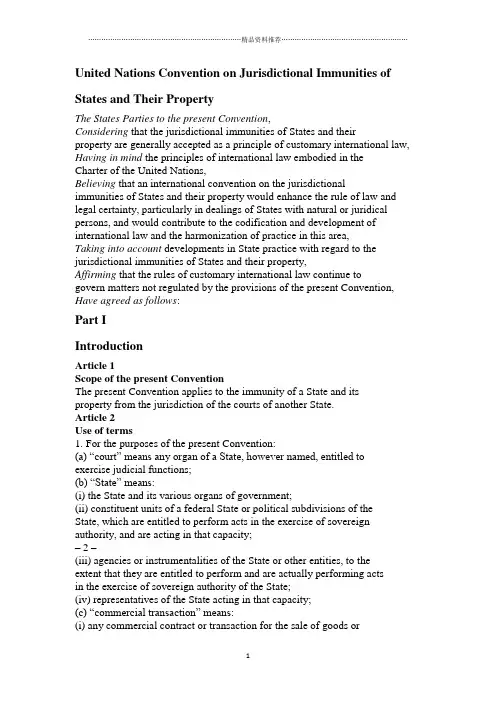
United Nations Convention on Jurisdictional Immunities of States and Their PropertyThe States Parties to the present Convention,Considering that the jurisdictional immunities of States and theirproperty are generally accepted as a principle of customary international law, Having in mind the principles of international law embodied in theCharter of the United Nations,Believing that an international convention on the jurisdictionalimmunities of States and their property would enhance the rule of law and legal certainty, particularly in dealings of States with natural or juridical persons, and would contribute to the codification and development of international law and the harmonization of practice in this area,Taking into account developments in State practice with regard to the jurisdictional immunities of States and their property,Affirming that the rules of customary international law continue togovern matters not regulated by the provisions of the present Convention, Have agreed as follows:Part IIntroductionArticle 1Scope of the present ConventionThe present Convention applies to the immunity of a State and itsproperty from the jurisdiction of the courts of another State.Article 2Use of terms1. For the purposes of the present Convention:(a) “court” means any organ of a State, however named, entitled to exercise judicial functions;(b) “State” means:(i) the State and its various organs of government;(ii) constituent units of a federal State or political subdivisions of the State, which are entitled to perform acts in the exercise of sovereign authority, and are acting in that capacity;– 2 –(iii) agencies or instrumentalities of the State or other entities, to theextent that they are entitled to perform and are actually performing actsin the exercise of sovereign authority of the State;(iv) representatives of the State acting in that capacity;(c) “commercial transaction” means:(i) any commercial contract or transaction for the sale of goods orsupply of services;(ii) any contract for a loan or other transaction of a financial nature, including any obligation of guarantee or of indemnity in respect of anysuch loan or transaction;(iii) any other contract or transaction of a commercial, industrial,trading or professional nature, but not including a contract ofemployment of persons.2. In determining whether a contract or transaction is a “commercial transaction” under paragraph 1 (c), reference should be made primarily to the nature of the contract or transaction, but its purpose should also be taken into account if the parties to the contract or transaction have so agreed, or if, in the practice of the State of the forum, that purpose is relevant to determining the non-commercial character of the contract or transaction.3. The provisions of paragraphs 1 and 2 regarding the use of terms in the present Convention are without prejudice to the use of those terms or to the meanings which may be given to them in other international instruments or in the internal law of any State.Article 3Privileges and immunities not affected by the present Convention1. The present Convention is without prejudice to the privileges and immunities enjoyed by a State under international law in relation to the exercise of the functions of:(a) its diplomatic missions, consular posts, special missions, missionsto international organizations or delegations to organs of international organizations or to international conferences; and(b) persons connected with them.2. The present Convention is without prejudice to privileges andimmunities accorded under international law to heads of State ratione personae.3. The present Convention is without prejudice to the immunities enjoyedby a State under international law with respect to aircraft or space objects owned or operated by a State.– 3 –Article 4Non-retroactivity of the present ConventionWithout prejudice to the application of any rules set forth in the present Convention to which jurisdictional immunities of States and their property are subject under international law independently of the present Convention, the present Convention shall not apply to any question of jurisdictional immunities of States or their property arising in a proceeding instituted against a State before a court of another State prior to the entry into force of the present Convention for the States concerned.Part IIGeneral principlesArticle 5State immunityA State enjoys immunity, in respect of itself and its property, from the jurisdiction of the courts of another State subject to the provisions of the present Convention.Article 6Modalities for giving effect to State immunity1. A State shall give effect to State immunity under article 5 by refraining from exercising jurisdiction in a proceeding before its courts against another State and to that end shall ensure that its courts determine on their own initiative that the immunity of that other State under article 5 is respected.2. A proceeding before a court of a State shall be considered to have been instituted against another State if that other State:(a) is named as a party to that proceeding; or(b) is not named as a party to the proceeding but the proceeding ineffect seeks to affect the property, rights, interests or activities of that other State.Article 7Express consent to exercise of jurisdiction1. A State cannot invoke immunity from jurisdiction in a proceeding beforea court of another State with regard to a matter or case if it has expressly consented to the exercise of jurisdiction by the court with regard to the matter or case:(a) by international agreement;(b) in a written contract; or– 4 –(c) by a declaration before the court or by a written communicationin a specific proceeding.2. Agreement by a State for the application of the law of another Stateshall not be interpreted as consent to the exercise of jurisdiction by the courts of that other State.Article 8Effect of participation in a proceeding before a court1. A State cannot invoke immunity from jurisdiction in a proceeding beforea court of another State if it has:(a) itself instituted the proceeding; or(b) intervened in the proceeding or taken any other step relating tothe merits. However, if the State satisfies the court that it could not have acquired knowledge of facts on which a claim to immunity can be based until after it took such a step, it can claim immunity based on those facts, provided it does so at the earliest possible moment.2. A State shall not be considered to have consented to the exercise ofjurisdiction by a court of another State if it intervenes in a proceeding or takes any other step for the sole purpose of:(a) invoking immunity; or(b) asserting a right or interest in property at issue in the proceeding.3. The appearance of a representative of a State before a court of another State as a witness shall not be interpreted as consent by the former State to the exercise of jurisdiction by the court.4. Failure on the part of a State to enter an appearance in a proceedingbefore a court of another State shall not be interpreted as consent by the former State to the exercise of jurisdiction by the court.Article 9Counterclaims1. A State instituting a proceeding before a court of another State cannot invoke immunity from the jurisdiction of the court in respect of any counterclaim arising out of the same legal relationship or facts as the principal claim.2. A State intervening to present a claim in a proceeding before a court of another State cannot invoke immunity from the jurisdiction of the court in respect of any counterclaim arising out of the same legal relationship or facts as the claim presented by the State.– 5 –3. A State making a counterclaim in a proceeding instituted against itbefore a court of another State cannot invoke immunity from the jurisdiction of the court in respect of the principal claim.Part IIIProceedings in which State immunity cannot be invokedArticle 10Commercial transactions1. If a State engages in a commercial transaction with a foreign natural or juridical person and, by virtue of the applicable rules of private international law, differences relating to the commercial transaction fall within the jurisdiction of a court of another State, the State cannot invoke immunity from that jurisdiction in a proceeding arising out of that commercial transaction.2. Paragraph 1 does not apply:(a) in the case of a commercial transaction between States; or(b) if the parties to the commercial transaction have expressly agreed otherwise.3. Where a State enterprise or other entity established by a State which hasan independent legal personality and is capable of:(a) suing or being sued; and(b) acquiring, owning or possessing and disposing of property,including property which that State has authorized it to operate or manage,is involved in a proceeding which relates to a commercial transaction in which that entity is engaged, the immunity from jurisdiction enjoyed by that State shall not be affected.Article 11Contracts of employment1. Unless otherwise agreed between the States concerned, a State cannot invoke immunity from jurisdiction before a court of another State which is otherwise competent in a proceeding which relates to a contract of employment between the State and an individual for work performed or to be performed, in whole or in part, in the territory of that other State.2. Paragraph 1 does not apply if:(a) the employee has been recruited to perform particular functions inthe exercise of governmental authority;(b) the employee is:– 6 –(i) a diplomatic agent, as defined in the Vienna Convention onDiplomatic Relations of 1961;(ii) a consular officer, as defined in the Vienna Convention onConsular Relations of 1963;(iii) a member of the diplomatic staff of a permanent mission to an international organization or of a special mission, or is recruited to represent a State at an international conference; or(iv) any other person enjoying diplomatic immunity;(c) the subject-matter of the proceeding is the recruitment, renewal of employment or reinstatement of an individual;(d) the subject-matter of the proceeding is the dismissal ortermination of employment of an individual and, as determined by the head of State, the head of Government or the Minister for Foreign Affairs of the employer State, such a proceeding would interfere with the security interests of that State;(e) the employee is a national of the employer State at the time whenthe proceeding is instituted, unless this person has the permanent residence in the State of the forum; or(f) the employer State and the employee have otherwise agreed inwriting, subject to any considerations of public policy conferring on the courts of the State of the forum exclusive jurisdiction by reason of the subject-matter of the proceeding.Article 12Personal injuries and damage to propertyUnless otherwise agreed between the States concerned, a State cannotinvoke immunity from jurisdiction before a court of another State which is otherwise competent in a proceeding which relates to pecuniary compensation for death or injury to the person, or damage to or loss of tangible property, caused by an act or omission which is alleged to be attributable to the State, ifthe act or omission occurred in whole or in part in the territory of that other State and if the author of the act or omission was present in that territory at the time of the act or omission.Article 13Ownership, possession and use of propertyUnless otherwise agreed between the States concerned, a State cannotinvoke immunity from jurisdiction before a court of another State which is otherwise competent in a proceeding which relates to the determination of:– 7 –(a) any right or interest of the State in, or its possession or use of, orany obligation of the State arising out of its interest in, or its possession or use of, immovable property situated in the State of the forum;(b) any right or interest of the State in movable or immovableproperty arising by way of succession, gift or bona vacantia; or(c) any right or interest of the State in the administration of property,such as trust property, the estate of a bankrupt or the property of a company in the event of its winding up.Article 14Intellectual and industrial propertyUnless otherwise agreed between the States concerned, a State cannotinvoke immunity from jurisdiction before a court of another State which is otherwise competent in a proceeding which relates to:(a) the determination of any right of the State in a patent, industrialdesign, trade name or business name, trademark, copyright or any other form of intellectual or industrial property which enjoys a measure of legal protection, even if provisional, in the State of the forum; or(b) an alleged infringement by the State, in the territory of the Stateof the forum, of a right of the nature mentioned in subparagraph (a) which belongs to a third person and is protected in the State of the forum.Article 15Participation in companies or other collective bodies1. A State cannot invoke immunity from jurisdiction before a court of another State which is otherwise competent in a proceeding which relates to its participation in a company or other collective body, whether incorporated or unincorporated, being a proceeding concerning the relationship between the State and the body or the other participants therein, provided that the body: (a) has participants other than States or international organizations;and(b) is incorporated or constituted under the law of the State of theforum or has its seat or principal place of business in that State.2. A State can, however, invoke immunity from jurisdiction in such a proceeding if the States concerned have so agreed or if the parties to the dispute have so provided by an agreement in writing or if the instrument establishing or regulating the body in question contains provisions to thateffect.– 8 –Article 16Ships owned or operated by a State1. Unless otherwise agreed between the States concerned, a State whichowns or operates a ship cannot invoke immunity from jurisdiction before a court of another State which is otherwise competent in a proceeding which relates to the operation of that ship if, at the time the cause of action arose, the ship was used for other than government non-commercial purposes.2. Paragraph 1 does not apply to warships, or naval auxiliaries, nor does it apply to other vessels owned or operated by a State and used, for the time being, only on government non-commercial service.3. Unless otherwise agreed between the States concerned, a State cannot invoke immunity from jurisdiction before a court of another State which is otherwise competent in a proceeding which relates to the carriage of cargo on board a ship owned or operated by that State if, at the time the cause of action arose, the ship was used for other than government non-commercial purposes.4. Paragraph 3 does not apply to any cargo carried on board the ships referred to in paragraph 2, nor does it apply to any cargo owned by a State and used or intended for use exclusively for government non-commercial purposes.5. States may plead all measures of defence, prescription and limitation of liability which are available to private ships and cargoes and their owners.6. If in a proceeding there arises a question relating to the government and non-commercial character of a ship owned or operated by a State or cargo owned by a State, a certificate signed by a diplomatic representative or other competent authority of that State and communicated to the court shall serve as evidence of the character of that ship or cargo.Article 17Effect of an arbitration agreementIf a State enters into an agreement in writing with a foreign natural or juridical person to submit to arbitration differences relating to a commercial transaction, that State cannot invoke immunity from jurisdiction before a court of another State which is otherwise competent in a proceeding which relates to:(a) the validity, interpretation or application of the arbitrationagreement;(b) the arbitration procedure; or(c) the confirmation or the setting aside of the award,unless the arbitration agreement otherwise provides.– 9 –Part IVState immunity from measures of constraint in connection withproceedings before a courtArticle 18State immunity from pre-judgment measures of constraintNo pre-judgment measures of constraint, such as attachment or arrest, against property of a State may be taken in connection with a proceeding before a court of another State unless and except to the extent that:(a) the State has expressly consented to the taking of such measuresas indicated:(i) by international agreement;(ii) by an arbitration agreement or in a written contract; or(iii) by a declaration before the court or by a written communicationafter a dispute between the parties has arisen; or(b) the State has allocated or earmarked property for the satisfactionof the claim which is the object of that proceeding.Article 19State immunity from post-judgment measures of constraintNo post-judgment measures of constraint, such as attachment, arrest or execution, against property of a State may be taken in connection with a proceeding before a court of another State unless and except to the extent that: (a) the State has expressly consented to the taking of such measuresas indicated:(i) by international agreement;(ii) by an arbitration agreement or in a written contract; or(iii) by a declaration before the court or by a written communicationafter a dispute between the parties has arisen; or(b) the State has allocated or earmarked property for the satisfactionof the claim which is the object of that proceeding; or(c) it has been established that the property is specifically in use orintended for use by the State for other than government non-commercial purposes and is in the territory of the State of the forum, provided that postjudgmentmeasures of constraint may only be taken against property that has a connection with the entity against which the proceeding was directed.– 10 –Article 20Effect of consent to jurisdiction to measures of constraintWhere consent to the measures of constraint is required under articles 18and 19, consent to the exercise of jurisdiction under article 7 shall not imply consent to the taking of measures of constraint.Article 21Specific categories of property1. The following categories, in particular, of property of a State shall notbe considered as property specifically in use or intended for use by the Statefor other than government non-commercial purposes under article 19, subparagraph (c):(a) property, including any bank account, which is used or intendedfor use in the performance of the functions of the diplomatic mission of the State or its consular posts, special missions, missions to international organizations or delegations to organs of international organizations or to international conferences;(b) property of a military character or used or intended for use in the performance of military functions;(c) property of the central bank or other monetary authority of theState;(d) property forming part of the cultural heritage of the State or partof its archives and not placed or intended to be placed on sale;(e) property forming part of an exhibition of objects of scientific,cultural or historical interest and not placed or intended to be placed on sale.2. Paragraph 1 is without prejudice to article 18 and article 19, subparagraphs (a) and (b).Part VMiscellaneous provisionsArticle 22Service of process1. Service of process by writ or other document instituting a proceeding against a State shall be effected:(a) in accordance with any applicable international conventionbinding on the State of the forum and the State concerned; or– 11 –(b) in accordance with any special arrangement for service betweenthe claimant and the State concerned, if not precluded by the law of the State of the forum; or(c) in the absence of such a convention or special arrangement:(i) by transmission through diplomatic channels to the Ministry ofForeign Affairs of the State concerned; or(ii) by any other means accepted by the State concerned, if notprecluded by the law of the State of the forum.2. Service of process referred to in paragraph 1 (c) (i) is deemed to have been effected by receipt of the documents by the Ministry of Foreign Affairs.3. These documents shall be accompanied, if necessary, by a translationinto the official language, or one of the official languages, of the State concerned.4. Any State that enters an appearance on the merits in a proceeding instituted against it may not thereafter assert that service of process did not comply with the provisions of paragraphs 1 and 3.Article 23Default judgment1. A default judgment shall not be rendered against a State unless the court has found that:(a) the requirements laid down in article 22, paragraphs 1 and 3, havebeen complied with;(b) a period of not less than four months has expired from the date onwhich the service of the writ or other document instituting a proceeding has been effected or deemed to have been effected in accordance with article 22, paragraphs 1 and 2; and(c) the present Convention does not preclude it from exercising jurisdiction.2. A copy of any default judgment rendered against a State, accompanied if necessary by a translation into the official language or one of the official languages of the State concerned, shall be transmitted to it through one of the means specified in article 22, paragraph 1, and in accordance with the provisions of that paragraph.3. The time-limit for applying to have a default judgment set aside shallnot be less than four months and shall begin to run from the date on which the copy of the judgment is received or is deemed to have been received by the State concerned.– 12 –Article 24Privileges and immunities during court proceedings1. Any failure or refusal by a State to comply with an order of a court of another State enjoining it to perform or refrain from performing a specific act or to produce any document or disclose any other information for the purposes of a proceeding shall entail no consequences other than those which may result from such conduct in relation to the merits of the case. In particular, no fine or penalty shall be imposed on the State by reason of such failure or refusal.2. A State shall not be required to provide any security, bond or deposit, however described, to guarantee the payment of judicial costs or expenses in any proceeding to which it is a respondent party before a court of another State.Part VIFinal clausesArticle 25AnnexThe annex to the present Convention forms an integral part of the Convention.Article 26Other international agreementsNothing in the present Convention shall affect the rights and obligationsof States Parties under existing international agreements which relate to matters dealt with in the present Convention as between the parties to those agreements.Article 27Settlement of disputes1. States Parties shall endeavour to settle disputes concerning the interpretation or application of the present Convention through negotiation.2. Any dispute between two or more States Parties concerning the interpretation or application of the present Convention which cannot be settled through negotiation within six months shall, at the request of any of those States Parties, be submitted to arbitration. If, six months after the date of the request for arbitration, those States Parties are unable to agree on the organization of the arbitration, any of those States Parties may refer the dispute to the International Court of Justice by request in accordance with the Statute of the Court.– 13 –3. Each State Party may, at the time of signature, ratification, acceptance or approval of, or accession to, the present Convention, declare that it does not consider itself bound by paragraph 2. The other States Parties shall not be bound by paragraph 2 with respect to any State Party which has made such a declaration.4. Any State Party that has made a declaration in accordance with paragraph 3 may at any time withdraw that declaration by notification to the Secretary-General of the United Nations.Article 28SignatureThe present Convention shall be open for signature by all States until17 January 2007, at United Nations Headquarters, New York.Article 29Ratification, acceptance, approval or accession1. The present Convention shall be subject to ratification, acceptance or approval.2. The present Convention shall remain open for accession by any State.3. The instruments of ratification, acceptance, approval or accession shallbe deposited with the Secretary-General of the United Nations.Article 30Entry into force1. The present Convention shall enter into force on the thirtieth dayfollowing the date of deposit of the thirtieth instrument of ratification, acceptance, approval or accession with the Secretary-General of the United Nations.2. For each State ratifying, accepting, approving or acceding to the present Convention after the deposit of the thirtieth instrument of ratification,acceptance, approval or accession, the Convention shall enter into force on the thirtieth day after the deposit by such State of its instrument of ratification, acceptance, approval or accession.Article 31Denunciation1. Any State Party may denounce the present Convention by written notification to the Secretary-General of the United Nations.2. Denunciation shall take effect one year following the date on which notification is received by the Secretary-General of the United Nations. The present Convention shall, however, continue to apply to any question of– 14 –jurisdictional immunities of States or their property arising in a proceeding instituted against a State before a court of another State prior to the date on which the denunciation takes effect for any of the States concerned.3. The denunciation shall not in any way affect the duty of any State Partyto fulfil any obligation embodied in the present Convention to which it would be subject under international law independently of the present Convention. Article 32Depositary and notifications1. The Secretary-General of the United Nations is designated thedepositary of the present Convention.2. As depositary of the present Convention, the Secretary-General of the United Nations shall inform all States of the following:(a) signatures of the present Convention and the deposit ofinstruments of ratification, acceptance, approval or accession or notifications of denunciation, in accordance with articles 29 and 31;(b) the date on which the present Convention will enter into force, in accordance with article 30;(c) any acts, notifications or communications relating to the present Convention.Article 33Authentic textsThe Arabic, Chinese, English, French, Russian and Spanish texts of the present Convention are equally authentic.IN WITNESS WHEREOF, the undersigned, being duly authorizedthereto by their respective Governments, have signed this Convention opened for signature at United Nations Headquarters in New York on 17 January 2005. – 15 –Annex to the ConventionUnderstandings with respect to certain provisions of the Convention。
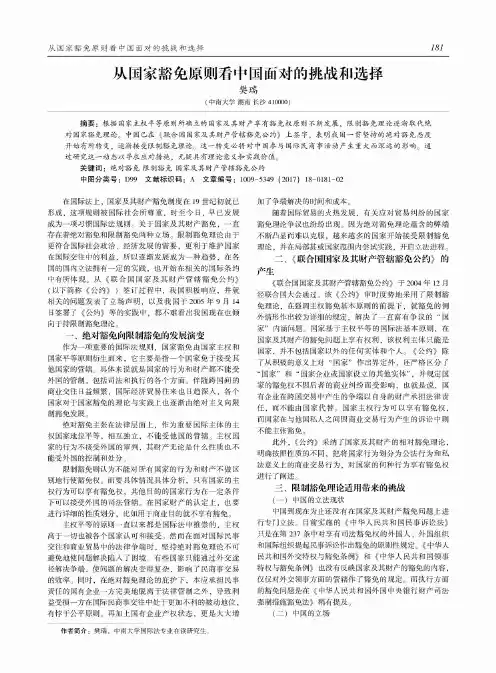
从国家豁免原则看中国面对的挑战和选择181从国家豁免原则看中国面对的挑战和选择樊瑞(中南大学湖南长沙410000)摘要:根据国家主权平等原则所确立的国家及其财产享有豁免权原则不断发展,限制豁免理论逐渐取代绝 对国家豁免理论。
中国已在《联合国国家及其财产管辖豁免公约》上签字,表明我国一贯坚持的绝对豁免态度 开始有所转变,逐渐接受限制豁免理论。
这一转变必将对中国参与国际民商事活动产生重大而深远的影响。
通 过研究这一动态以寻求应对措施,无疑具有理论意义和实践价值。
关键词:绝对豁免限制豁免国家及其财产管辖豁免公约中图分类号:D99文献标识码:A文章编号:1009-5349 (2017) 18-0181-02在国际法上,国家及其财产豁免制度在19世纪初就已 形成,这项规则被国际社会所尊重,时至今日,早已发展 成为一项习惯国际法规则。
关于国家及其财产豁免,一直 存在着绝对豁免和限制豁免两种立场。
限制豁免理论由于 更符合国际社会政治、经济发展的需要,更利于维护国家 在国际交往中的利益,所以逐渐发展成为一种趋势,在各 国的国内立法拥有一定的实践,也开始在相关的国际条约 中有所体现。
从《联合国国家及其财产管辖豁免公约》(以下简称《公约》)签订过程中,我国积极响应,并就 相关的问题发表了立场声明,以及我国于2005年9月14 日签署了《公约》等的实践中,都不难看出我国现在也倾 向于持限制豁免理论。
一、绝对豁免向限制豁免的发展演变作为一项重要的国际法规则,国家豁免由国家主权和 国家平等原则衍生而来,它主要是指一个国家免于接受其 他国家的管辖。
具体来说就是国家的行为和财产都不能受 外国的管制,包括司法和执行的各个方面。
伴随跨国间的 商业交往日益频繁,国际经济贸易往来也日趋深人,各个 国家对于国家豁免的理论与实践上也逐渐由绝对主义向限 制豁免发展。
绝对豁免主张在法律层面上,作为重要国际主体的主 权国家地位平等,相互独立,不能受他国的管辖。
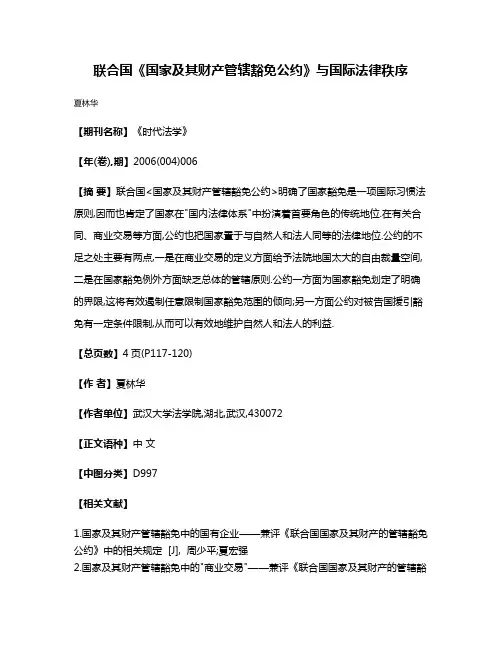
联合国《国家及其财产管辖豁免公约》与国际法律秩序
夏林华
【期刊名称】《时代法学》
【年(卷),期】2006(004)006
【摘要】联合国<国家及其财产管辖豁免公约>明确了国家豁免是一项国际习惯法原则,因而也肯定了国家在"国内法律体系"中扮演着首要角色的传统地位.在有关合同、商业交易等方面,公约也把国家置于与自然人和法人同等的法律地位.公约的不足之处主要有两点,一是在商业交易的定义方面给予法院地国太大的自由裁量空间,二是在国家豁免例外方面缺乏总体的管辖原则.公约一方面为国家豁免划定了明确的界限,这将有效遏制任意限制国家豁免范围的倾向;另一方面公约对被告国援引豁免有一定条件限制,从而可以有效地维护自然人和法人的利益.
【总页数】4页(P117-120)
【作者】夏林华
【作者单位】武汉大学法学院,湖北,武汉,430072
【正文语种】中文
【中图分类】D997
【相关文献】
1.国家及其财产管辖豁免中的国有企业——兼评《联合国国家及其财产的管辖豁免公约》中的相关规定 [J], 周少平;夏宏强
2.国家及其财产管辖豁免中的"商业交易"——兼评《联合国国家及其财产的管辖豁
免公约》中的相关规定 [J], 周少平;夏宏强
3.《联合国国家及其财产管辖豁免公约》与国际民商新秩序的构建 [J], 黄文旭
4.《联合国国家及其财产管辖豁免公约》与国际民商新秩序的构建 [J], 黄文旭;
5.国家管辖豁免的新发展——以《联合国国家及其财产管辖豁免公约》的司法实践为视角 [J], 赵雯媛
因版权原因,仅展示原文概要,查看原文内容请购买。
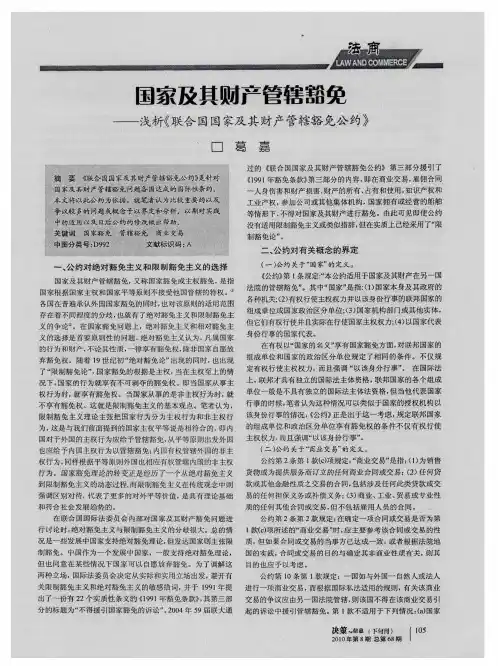

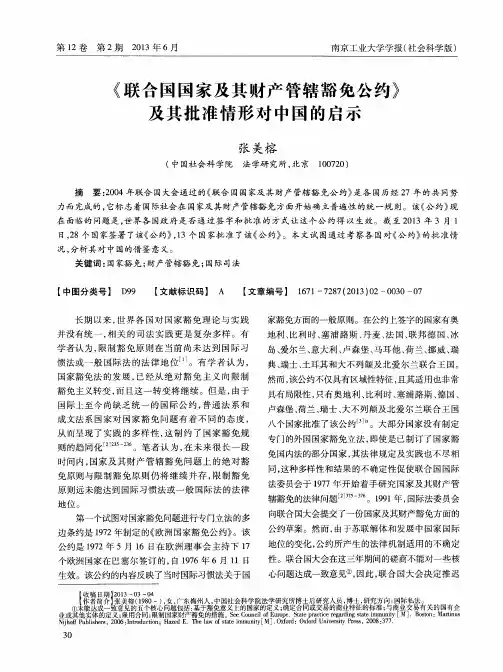
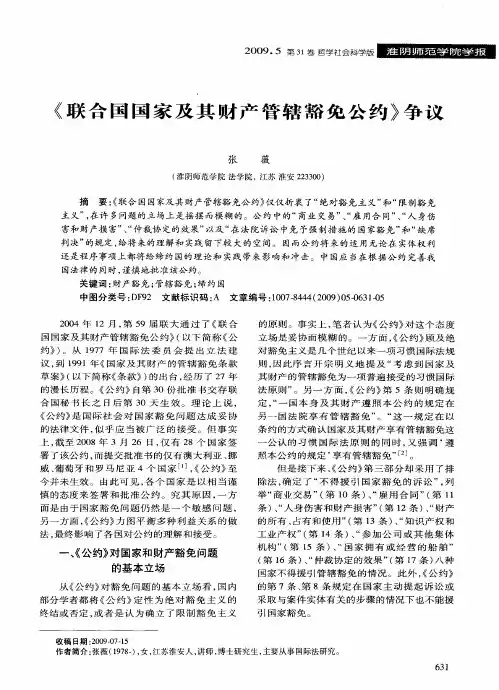
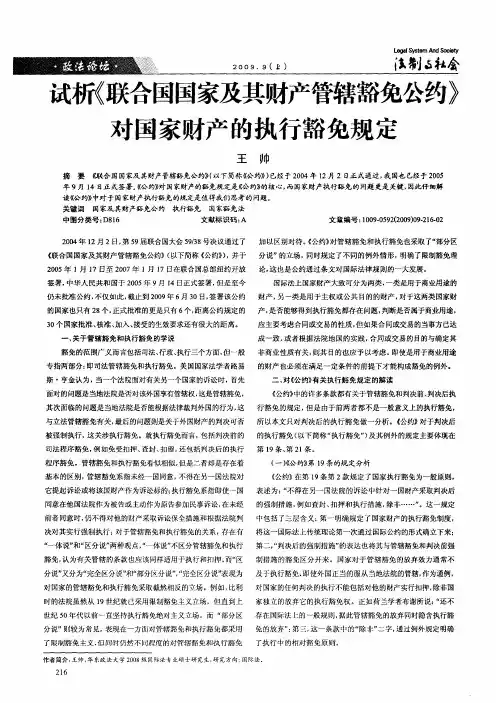
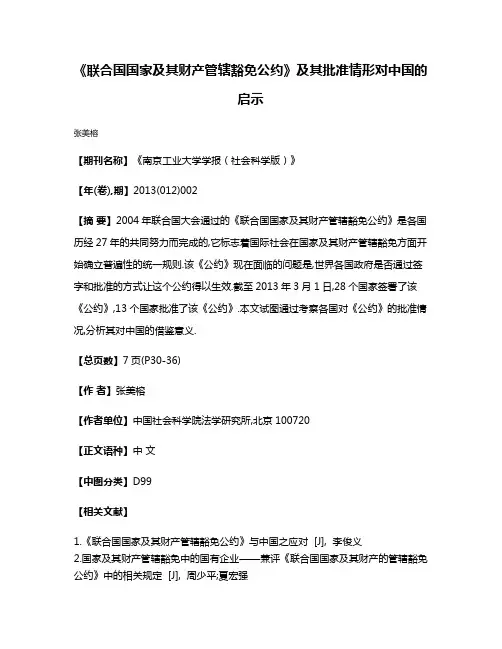
《联合国国家及其财产管辖豁免公约》及其批准情形对中国的
启示
张美榕
【期刊名称】《南京工业大学学报(社会科学版)》
【年(卷),期】2013(012)002
【摘要】2004年联合国大会通过的《联合国国家及其财产管辖豁免公约》是各国历经27年的共同努力而完成的,它标志着国际社会在国家及其财产管辖豁免方面开始确立普遍性的统一规则.该《公约》现在面临的问题是,世界各国政府是否通过签字和批准的方式让这个公约得以生效.截至2013年3月1日,28个国家签署了该《公约》,13个国家批准了该《公约》.本文试图通过考察各国对《公约》的批准情况,分析其对中国的借鉴意义.
【总页数】7页(P30-36)
【作者】张美榕
【作者单位】中国社会科学院法学研究所,北京100720
【正文语种】中文
【中图分类】D99
【相关文献】
1.《联合国国家及其财产管辖豁免公约》与中国之应对 [J], 李俊义
2.国家及其财产管辖豁免中的国有企业——兼评《联合国国家及其财产的管辖豁免公约》中的相关规定 [J], 周少平;夏宏强
3.国家及其财产管辖豁免中的"商业交易"——兼评《联合国国家及其财产的管辖豁免公约》中的相关规定 [J], 周少平;夏宏强
4.国家管辖豁免的新发展——以《联合国国家及其财产管辖豁免公约》的司法实践为视角 [J], 赵雯媛
5.国家管辖豁免的新发展——以《联合国国家及其财产管辖豁免公约》的司法实践为视角 [J], 赵雯媛
因版权原因,仅展示原文概要,查看原文内容请购买。
全国2018年4月高等教育自学考试国际经济法概论试题课程代码:00246一、单项选择题:本大题共20小题,每小题l分,共20分。
在每小题列出的备选项中只有一项是最符合题目要求的,请将其选出。
1.下列属于国际经济条约的是(A)1-66A.《联合国国际货物买卖合同公约》B.《华沙一牛津规则》C.《托收统一规则》D.《国际贸易术语解释通则》#<br/>【解析】<br/>在国际货物买卖方面,有《关于国际货物买卖合同成立统一法公约》(1964年)、《关于国际货物买卖统一法公约》(1964年)、《国际货物买卖时效期限公约》(1974年)、《联合国国际货物买卖合同公约》(1980年)等。
2.下列关于国际经济法的基本原则“公平互利原则”理解正确的是(B)1-69A.公平指形式上的公平B.公平更要求实质上的平等C.为实现实质的平等可以损害一方的利益D.公平互利的核心和基础是公平#<br/>【解析】<br/>所谓公平,一般可理解为“公正平等”和“公平合理”。
真实意义上的公平,不仅要求在形式上的平等,而且要求实现实质上的平等。
所谓互利,是指要照顾到有关各方的利益,不能为谋求单方利益而无视甚至损害他方利益。
公平互利合而为一个原则,是一个统一体,其中互利是核心和基础,没有互利就谈不上公平,公平必然要求互利,公平和互利密不可分,否则就会造成对这一原则的曲解。
3.确定法人国籍标准的住所地说认为法人的住所是指法人的(C)2-74A.注册地B.成立地C.管理中心地D.资本所在地4.《联合国国家及其财产管辖豁免公约》在国家豁免问题上采取的立场是(B)2-79A.绝对豁免B.限制豁免C.管辖豁免D.执行豁免5.根据《联合国国际货物销售合同公约》,判断买卖合同具有国际性的唯一标准是(A)3-89A.合同当事人的营业地处于不同的国家B.合同项下的货物运输跨越了国境C.当事人的国籍不同D.卖方要约或买方承诺的地点非在同一国家#<br/>【解析】<br/>在确定买卖合同是否具有国际性时,公约以合同当事人的营业地是否处于不同的国家作为唯一的标准。
United Nations Convention on Jurisdictional Immunities of States and Their PropertyThe States Parties to the present Convention,Considering that the jurisdictional immunities of States and their property are generally accepted as a principle of customary international law,Having in mind the principles of international law embodied in the Charter of the United Nations,Believing that an international convention on the jurisdictional immunities of States and their property would enhance the rule of law andlegal certainty, particularly in dealings of States with natural or juridicalpersons, and would contribute to the codification and development ofinternational law and the harmonization of practice in this area, Taking into account developments in State practice with regard to thejurisdictional immunities of States and their property, Affirming that the rules of customary international law continue togovern matters not regulated by the provisions of the presentConvention,Have agreed as follows:Part IIntroductionArticle 1Scope of the present ConventionThe present Convention applies to the immunity of a State and its property from the jurisdiction of the courts of another State. Article 2Use of terms1. For the purposes of the present Convention:(a) “court” means any organ of a State, however named, entitled toexercise judicial functions;(b) “State” means:(i) the State and its various organs of government;(ii) constituent units of a federal State or political subdivisions of theState, which are entitled to perform acts in the exercise of sovereignauthority, and are acting in that capacity;– 2 –(iii) agencies or instrumentalities of the State or other entities, to theextent that they are entitled to perform and are actually performing actsin the exercise of sovereign authority of the State;(iv) representatives of the State acting in that capacity;(c) “mercial transaction” means:(i) any mercial contract or transaction for the sale of goods or supply of services;(ii) any contract for a loan or other transaction of a financial nature,including any obligation of guarantee or of indemnity in respect of anysuch loan or transaction;(iii) any other contract or transaction of a mercial, industrial, trading or professional nature, but not including a contract of employment of persons.2. In determining whether a contract or transaction is a “mercial transaction” under paragraph 1 (c), reference should be made primarily to thenature of the contract or transaction, but its purpose should also be taken intoaccount if the parties to the contract or transaction have so agreed, or if, in thepractice of the State of the forum, that purpose is relevant to determining thenon-mercial character of the contract or transaction.3. The provisions of paragraphs 1 and 2 regarding the use of terms in thepresent Convention are without prejudice to the use of those terms or to themeanings which may be given to them in other international instruments or inthe internal law of any State.Article 3Privileges and immunities not affected by the present Convention 1. The present Convention is without prejudice to the privileges andimmunities enjoyed by a State under international law in relation to theexercise of the functions of:(a) its diplomatic missions, consular posts, special missions, missionsto international organizations or delegations to organs ofinternationalorganizations or to international conferences; and(b) persons connected with them.2. The present Convention is without prejudice to privileges and immunities accorded under international law to heads of State rationepersonae.3. The present Convention is without prejudice to the immunities enjoyedby a State under international law with respect to aircraft or space objectsowned or operated by a State.– 3 –Article 4Non-retroactivity of the present ConventionWithout prejudice to the application of any rules set forth in the presentConvention to which jurisdictional immunities of States and their property aresubject under international law independently of the present Convention, thepresent Convention shall not apply to any question of jurisdictionalimmunitiesof States or their property arising in a proceeding instituted against a Statebefore a court of another State prior to the entry into force of the presentConvention for the States concerned.Part IIGeneral principlesArticle 5State immunityA State enjoys immunity, in respect of itself and its property, from thejurisdiction of the courts of another State subject to the provisions of thepresent Convention.Article 6Modalities for giving effect to State immunity1. A State shall give effect to State immunity under article 5 by refrainingfrom exercising jurisdiction in a proceeding before its courts against anotherState and to that end shall ensure that its courts determine on theirowninitiative that the immunity of that other State under article 5 is respected.2. A proceeding before a court of a State shall be considered to have beeninstituted against another State if that other State:(a) is named as a party to that proceeding; or(b) is not named as a party to the proceeding but the proceeding ineffect seeks to affect the property, rights, interests or activities of that otherState.Article 7Express consent to exercise of jurisdiction1. A State cannot invoke immunity from jurisdiction in a proceeding beforea court of another State with regard to a matter or case if it has expresslyconsented to the exercise of jurisdiction by the court with regard to the matteror case:(a) by international agreement;(b) in a written contract; or– 4 –(c) by a declaration before the court or by a written munication in a specific proceeding.2. Agreement by a State for the application of the law of another Stateshall not be interpreted as consent to the exercise of jurisdiction by the courtsof that other State.Article 8Effect of participation in a proceeding before a court1. A State cannot invoke immunity from jurisdiction in a proceeding beforea court of another State if it has:(a) itself instituted the proceeding; or(b) intervened in the proceeding or taken any other step relating tothe merits. However, if the State satisfies the court that it could not haveacquired knowledge of facts on which a claim to immunity can be based untilafter it took such a step, it can claim immunity based on those facts,providedit does so at the earliest possible moment.2. A State shall not be considered to have consented to the exercise ofjurisdiction by a court of another State if it intervenes in a proceeding or takesany other step for the sole purpose of:(a) invoking immunity; or(b) asserting a right or interest in property at issue in the proceeding.3. The appearance of a representative of a State before a court of anotherState as a witness shall not be interpreted as consent by the former State to theexercise of jurisdiction by the court.4. Failure on the part of a State to enter an appearance in a proceedingbefore a court of another State shall not be interpreted as consent by the formerState to the exercise of jurisdiction by the court.Article 9Counterclaims1. A State instituting a proceeding before a court of another State cannotinvoke immunity from the jurisdiction of the court in respect of anycounterclaim arising out of the same legal relationship or facts as the principalclaim.2. A State intervening to present a claim in a proceeding beforea court ofanother State cannot invoke immunity from the jurisdiction of the court inrespect of any counterclaim arising out of the same legal relationship or factsas the claim presented by the State.– 5 –3. A State making a counterclaim in a proceeding instituted against itbefore a court of another State cannot invoke immunity from the jurisdiction ofthe court in respect of the principal claim.Part IIIProceedings in which State immunity cannot be invokedArticle 10mercial transactions1. If a State engages in a mercial transaction with a foreign natural orjuridical person and, by virtue of the applicable rules of private internationallaw, differences relating to the mercial transaction fall within thejurisdiction of a court of another State, the State cannot invoke immunity fromthat jurisdiction in a proceeding arising out of that mercial transaction.2. Paragraph 1 does not apply:(a) in the case of a mercial transaction between States; or(b) if the parties to the mercial transaction have expressly agreed otherwise.3. Where a State enterprise or other entity established by a State which hasan independent legal personality and is capable of:(a) suing or being sued; and(b) acquiring, owning or possessing and disposing of property, including property which that State has authorized it to operateor manage,is involved in a proceeding which relates to a mercial transaction in whichthat entity is engaged, the immunity from jurisdiction enjoyed by that Stateshall not be affected.Article 11Contracts of employment1. Unless otherwise agreed between the States concerned, a State cannotinvoke immunity from jurisdiction before a court of another State which isotherwise petent in a proceeding which relates to a contract of employment between the State and an individual for work performed or to beperformed, in whole or in part, in the territory of that other State.2. Paragraph 1 does not apply if:(a) the employee has been recruited to perform particular functions inthe exercise of governmental authority;(b) the employee is:– 6 –(i) a diplomatic agent, as defined in the Vienna Convention on Diplomatic Relations of 1961;(ii) a consular officer, as defined in the Vienna Convention on Consular Relations of 1963;(iii) a member of the diplomatic staff of a permanent mission to aninternational organization or of a special mission, or is recruited torepresent a State at an international conference; or(iv) any other person enjoying diplomatic immunity;(c) the subject-matter of the proceeding is the recruitment, renewal ofemployment or reinstatement of an individual;(d) the subject-matter of the proceeding is the dismissal or termination of employment of an individual and, as determined by the head ofState, the head of Government or the Minister for Foreign Affairs of theemployer State, such a proceeding would interfere with the security interests ofthat State;(e) the employee is a national of the employer State at the timewhenthe proceeding is instituted, unless this person has the permanent residence inthe State of the forum; or(f) the employer State and the employee have otherwise agreed in writing, subject to any considerations of public policy conferring on the courtsof the State of the forum exclusive jurisdiction by reason of the subject-matterof the proceeding.Article 12Personal injuries and damage to propertyUnless otherwise agreed between the States concerned, a State cannot invoke immunity from jurisdiction before a court of another State which isotherwise petent in a proceeding which relates to pecuniary pensationfor death or injury to the person, or damage to or loss of tangible property,caused by an act or omission which is alleged to be attributable to the State, ifthe act or omission occurred in whole or in part in the territoryof that otherState and if the author of the act or omission was present in that territory at thetime of the act or omission.Article 13Ownership, possession and use of propertyUnless otherwise agreed between the States concerned, a State cannot invoke immunity from jurisdiction before a court of another State which isotherwise petent in a proceeding which relates to the determination of:– 7 –(a) any right or interest of the State in, or its possession or use of, orany obligation of the State arising out of its interest in, or its possession or useof, immovable property situated in the State of the forum;(b) any right or interest of the State in movable or immovable property arising by way of succession, gift or bona vacantia; or (c) any right or interest of the State in the administration of property,such as trust property, the estate of a bankrupt or the propertyof a pany inthe event of its winding up.Article 14Intellectual and industrial propertyUnless otherwise agreed between the States concerned, a State cannot invoke immunity from jurisdiction before a court of another State which isotherwise petent in a proceeding which relates to:(a) the determination of any right of the State in a patent, industrialdesign, trade name or business name, trademark, copyright or any other formof intellectual or industrial property which enjoys a measure of legalprotection, even if provisional, in the State of the forum; or (b) an alleged infringement by the State, in the territory of the Stateof the forum, of a right of the nature mentioned in subparagraph (a) whichbelongs to a third person and is protected in the State of the forum. Article 15Participation in panies or other collective bodies1. A State cannot invoke immunity from jurisdiction before a court ofanother State which is otherwise petent in a proceeding which relates to itsparticipation in a pany or other collective body, whether incorporated orunincorporated, being a proceeding concerning the relationship between theState and the body or the other participants therein, provided that the body:(a) has participants other than States or international organizations;and(b) is incorporated or constituted under the law of the State of theforum or has its seat or principal place of business in that State.2. A State can, however, invoke immunity from jurisdiction in such aproceeding if the States concerned have so agreed or if the parties to thedispute have so provided by an agreement in writing or if the instrumentestablishing or regulating the body in question contains provisions to thateffect.– 8 –Article 16Ships owned or operated by a State1. Unless otherwise agreed between the States concerned, a State whichowns or operates a ship cannot invoke immunity from jurisdiction before acourt of another State which is otherwise petent in a proceeding whichrelates to the operation of that ship if, at the time the cause of action arose, theship was used for other than government non-mercial purposes. 2. Paragraph 1 does not apply to warships, or naval auxiliaries, nor does itapply to other vessels owned or operated by a State and used, for the timebeing, only on government non-mercial service.3. Unless otherwise agreed between the States concerned, a State cannotinvoke immunity from jurisdiction before a court of another State which isotherwise petent in a proceeding which relates to the carriage of cargo onboard a ship owned or operated by that State if, at the time the cause of actionarose, the ship was used for other than government non-mercial purposes.4. Paragraph 3 does not apply to any cargo carried on board the ships referred to in paragraph 2, nor does it apply to any cargo owned by a State andused or intended for use exclusively for government non-mercial purposes.5. States may plead all measures of defence, prescription and limitation ofliability which are available to private ships and cargoes and their owners.6. If in a proceeding there arises a question relating to the government andnon-mercial character of a ship owned or operated by a State or cargo owned by a State, a certificate signed by a diplomatic representative or otherpetent authority of that State and municated to the court shall serve asevidence of the character of that ship or cargo.Article 17Effect of an arbitration agreementIf a State enters into an agreement in writing with a foreign natural orjuridical person to submit to arbitration differences relating to a mercialtransaction, that State cannot invoke immunity from jurisdiction before a courtof another State which is otherwise petent in a proceeding which relatesto:(a) the validity, interpretation or application of the arbitration agreement;(b) the arbitration procedure; or(c) the confirmation or the setting aside of the award,unless the arbitration agreement otherwise provides.– 9 –Part IVState immunity from measures of constraint in connectionwithproceedings before a courtArticle 18State immunity from pre-judgment measures of constraintNo pre-judgment measures of constraint, such as attachment or arrest,against property of a State may be taken in connection with a proceedingbefore a court of another State unless and except to the extent that: (a) the State has expressly consented to the taking of such measures as indicated:(i) by international agreement;(ii) by an arbitration agreement or in a written contract; or (iii) by a declaration before the court or by a written munication after a dispute between the parties has arisen; or(b) the State has allocated or earmarked property for the satisfactionof the claim which is the object of that proceeding.Article 19State immunity from post-judgment measures of constraintNo post-judgment measures of constraint, such as attachment, arrest orexecution, against property of a State may be taken in connection with aproceeding before a court of another State unless and except to the extent that:(a) the State has expressly consented to the taking of such measures as indicated:(i) by international agreement;(ii) by an arbitration agreement or in a written contract; or (iii) by a declaration before the court or by a written munication after a dispute between the parties has arisen; or(b) the State has allocated or earmarked property for the satisfactionof the claim which is the object of that proceeding; or(c) it has been established that the property is specifically in use orintended for use by the State for other than government non-mercial purposes and is in the territory of the State of the forum, provided that postjudgmentmeasures of constraint may only be taken against property that has aconnection with the entity against which the proceeding was directed.– 10 –Article 20Effect of consent to jurisdiction to measures of constraint Where consent to the measures of constraint is required under articles 18and 19, consent to the exercise of jurisdiction under article 7 shall not implyconsent to the taking of measures of constraint.Article 21Specific categories of property1. The following categories, in particular, of property of a State shall notbe considered as property specifically in use or intended for use by the Statefor other than government non-mercial purposes under article 19, subparagraph (c):(a) property, including any bank account, which is used or intended for use in the performance of the functions of the diplomatic mission of theState or its consular posts, special missions, missions to internationalorganizations or delegations to organs of internationalorganizations or tointernational conferences;(b) property of a military character or used or intended for use in theperformance of military functions;(c) property of the central bank or other monetary authority of the State;(d) property forming part of the cultural heritage of the State or partof its archives and not placed or intended to be placed on sale;(e) property forming part of an exhibition of objects of scientific, cultural or historical interest and not placed or intended to be placed on sale.2. Paragraph 1 is without prejudice to article 18 and article 19, subparagraphs (a) and (b).Part VMiscellaneous provisionsArticle 22Service of process1. Service of process by writ or other document instituting a proceedingagainst a State shall be effected:(a) in accordance with any applicable international convention binding on the State of the forum and the State concerned; or– 11 –(b) in accordance with any special arrangement for service between the claimant and the State concerned, if not precluded by the law of the Stateof the forum; or(c) in the absence of such a convention or special arrangement: (i) by transmission through diplomatic channels to the Ministry of Foreign Affairs of the State concerned; or(ii) by any other means accepted by the State concerned, if not precluded by the law of the State of the forum.2. Service of process referred to in paragraph 1 (c) (i) is deemed to havebeen effected by receipt of the documents by the Ministry of Foreign Affairs.3. These documents shall be acpanied, if necessary, by a translation into the official language, or one of the official languages, of the Stateconcerned.4. Any State that enters an appearance on the merits in a proceeding instituted against it may not thereafter assert that service ofprocess did notply with the provisions of paragraphs 1 and 3.Article 23Default judgment1. A default judgment shall not be rendered against a State unless the courthas found that:(a) the requirements laid down in article 22, paragraphs 1 and 3, havebeen plied with;(b) a period of not less than four months has expired from the date onwhich the service of the writ or other document instituting a proceeding hasbeen effected or deemed to have been effected in accordance with article 22,paragraphs 1 and 2; and(c) the present Convention does not preclude it from exercising jurisdiction.2. A copy of any default judgment rendered against a State, acpanied ifnecessary by a translation into the official language or one of theofficiallanguages of the State concerned, shall be transmitted to it through one of themeans specified in article 22, paragraph 1, and in accordance with theprovisions of that paragraph.3. The time-limit for applying to have a default judgment set aside shallnot be less than four months and shall begin to run from the date on which thecopy of the judgment is received or is deemed to have been received by theState concerned.– 12 –Article 24Privileges and immunities during court proceedings1. Any failure or refusal by a State to ply with an order of a court ofanother State enjoining it to perform or refrain from performing a specific actor to produce any document or disclose any other information for the purposesof a proceeding shall entail no consequences other than those which may resultfrom such conduct in relation to the merits of the case. In particular, no fine orpenalty shall be imposed on the State by reason of such failure or refusal.2. A State shall not be required to provide any security, bond or deposit,however described, to guarantee the payment of judicial costs or expenses inany proceeding to which it is a respondent party before a court of anotherState.Part VIFinal clausesArticle 25AnnexThe annex to the present Convention forms an integral part of the Convention.Article 26Other international agreementsNothing in the present Convention shall affect the rights andobligationsof States Parties under existing international agreements which relate tomatters dealt with in the present Convention as between the parties to thoseagreements.Article 27Settlement of disputes1. States Parties shall endeavour to settle disputes concerning the interpretation or application of the present Convention through negotiation.2. Any dispute between two or more States Parties concerning the interpretation or application of the present Convention which cannot be settledthrough negotiation within six months shall, at the request of any of thoseStates Parties, be submitted to arbitration. If, six months after the date of therequest for arbitration, those States Parties are unable to agree on theorganization of the arbitration, any of those States Parties may refer the disputeto the International Court of Justice by request in accordance with the Statuteof the Court.– 13 –3. Each State Party may, at the time of signature, ratification, acceptance orapproval of, or accession to, the present Convention, declare that it does notconsider itself bound by paragraph 2. The other States Parties shall not bebound by paragraph 2 with respect to any State Party which has made such adeclaration.4. Any State Party that has made a declaration in accordance with paragraph 3 may at any time withdraw that declaration by notification to theSecretary-General of the United Nations.Article 28SignatureThe present Convention shall be open for signature by all States until17 January 2007, at United Nations Headquarters, New York.Article 29Ratification, acceptance, approval or accession1. The present Convention shall be subject to ratification, acceptance orapproval.2. The present Convention shall remain open for accession by any State.3. The instruments of ratification, acceptance, approval or accession shallbe deposited with the Secretary-General of the United Nations. Article 30Entry into force1. The present Convention shall enter into force on the thirtieth dayfollowing the date of deposit of the thirtieth instrument of ratification,acceptance, approval or accession with the Secretary-General of the UnitedNations.2. For each State ratifying, accepting, approving or acceding to the presentConvention after the deposit of the thirtieth instrument ofratification,acceptance, approval or accession, the Convention shall enter into force on thethirtieth day after the deposit by such State of its instrument of ratification,acceptance, approval or accession.Article 31Denunciation1. Any State Party may denounce the present Convention by written notification to the Secretary-General of the United Nations.2. Denunciation shall take effect one year following the date on whichnotification is received by the Secretary-General of the United Nations. Thepresent Convention shall, however, continue to apply to any question of– 14 –jurisdictional immunities of States or their property arising in a proceedinginstituted against a State before a court of another State prior to the date onwhich the denunciation takes effect for any of the States concerned.3. The denunciation shall not in any way affect the duty of any State Partyto fulfil any obligation embodied in the present Convention to which it wouldbe subject under international law independently of the present Convention.Article 32Depositary and notifications1. The Secretary-General of the United Nations is designated the depositary of the present Convention.2. As depositary of the present Convention, the Secretary-General of theUnited Nations shall inform all States of the following:(a) signatures of the present Convention and the deposit of instruments of ratification, acceptance, approval or accession or notificationsof denunciation, in accordance with articles 29 and 31;(b) the date on which the present Convention will enter into force, inaccordance with article 30;(c) any acts, notifications or munications relating to the present Convention.。
《联合国国家及其财产管辖豁免公约》评介《联合国国家及其财产管辖豁免公约》是第一个全面规范国家及其财产管辖豁免问题的普遍性国际公约,也是第一个确认国家及其财产限制豁免的普遍性国际公约。
该《公约》的通过和开放签署对国际法的发展具有重要的理论和现实意义。
一、《公约》的起草背景和过程国家豁免主要涉及一国法院对他国的国家行为及财产是否有权管辖,以及对外国财产是否有权强制执行问题。
其对象是外国的国家行为及国家财产,其本质涉及如何协调两个国家主权和两种利益的关系这一重大而敏感问题。
如何在主张豁免国的国家人格的域外效力与给予豁免国的司法主权的域内效力之间取得合理平衡,以及如何在保护国家利益与保护个人利益之间保持合理平衡,不仅是一个法律问题,而且是一个政治问题,涉及政治考量、价值判断和政策取舍等许多因素。
纵观1812年美国联邦法院在斯库诺交易号案(Schooner Exchange Case)开始确立国家司法管辖豁免这一原则以来近两个世纪的历史,国家豁免的国际法规则的演变大体经历了两个阶段:在20世纪50年代前的一个半世纪,各国普遍奉行绝对豁免原则,即国家行为及财产在另一国法院享有绝对不受管辖和不得执行的特权。
自20世纪50年代以来的半个世纪,国际实践基本上是绝对豁免与限制豁免两种原则并存,但国际上主张限制豁免原则的呼声渐高。
以英、美为代表的西方国家及部分发展中国家认为,国家和私人当事方在商业活动中的地位应当是平等的,国家在其商业性活动中不应享有特权,一国法院应对他国的商业活动有管辖权。
限制豁免原则把国家行为分为统治权行为(acta jure inperii)或称主权行为、公法行为与管理权行为。
(acta jure gestionis)或称非主权行为、私法行为,主张国家的立法、行政、司法等统治权行为可以享受豁免,而国家从事商业活动等非主权行为不能享受豁免。
美国、英国分别于1976年、1978年制订了有关限制豁免的国内立法,欧盟也在1972年制订了《欧洲国家豁免公约》,限制豁免的立法和司法实践逐渐盛行。
·新问题笔谈·政治与法律2007年第1期《联合国国家及其财产管辖豁免公约》规则的性质与适用王虎华罗国强(华东政法学院,上海200042)摘要:《联合国国家及其财产管辖豁免公约》规定了国家主权有限豁免的内容和标准。
《公约》有关有限豁免主义的规则是国际条约法规范,尚不能构成国际习惯法规范。
但《公约》的通过与日后的生效,将促使有限豁免主义发展成为国际习惯法。
《公约》规则在我国不应得到直接适用。
我国应制定关于国家及其财产豁免的法律,一方面将《公约》规则转化为国内法并在缔约国之间适用,另一方面对非缔约国(也包括对《公约》提出保留的缔约国)继续实行对等原则。
在今后的司法实践中,应以《公约》规则来解释国内法,从而使国内法与《公约》保持一致。
关键词:《联合国国家及其财产管辖豁免公约》;管辖豁免;执行豁免;国际公约中图分类号:DF92 文献标识码:A 文章编号:1005-9512(2007)01-0034-05《联合国国家及其财产管辖豁免公约》(以下简称《公约》)已经于2004年12月2日通过。
截止2006年12月5日,《公约》已经得到了25个国家的签署。
1 《公约》有望在2007年1月17日,即《公约》第28条所规定的开放签署截止日期前得到30个以上国家的签署。
我国已经于2005年9月14日签署了《公约》,故而可见,我国将在适当的时候批准《公约》,而生效后的《公约》也将在我国国内适用。
一、《公约》的主要规则及其性质(一)《公约》的主要规则首先,国家行为及财产在他国享有诉讼管辖豁免、诉讼保全豁免和强制执行豁免,2 但国家也可以通过明示同意、主动参与诉讼或反诉的方式放弃这些豁免。
其次,国家在商业交易、雇佣合同、侵权、财产权、知识产权、参加公司或其他集体机构、国家拥有或经营的船舶、仲裁协议的效果等8种例外情况下,不享有诉讼管辖豁免;判断是否属于商业交易,作者简介:王虎华,华东政法学院教授、博士生导师;罗国强,华东政法学院讲师、法学博士。
《联合国国家及其财产管辖豁免公约》述评
赵千喜背景资料:国家豁免是国际法上一个比较古老的原则,但随着国家与外国
自然人或法人之间跨国法律纠纷的大量增多,一国政府及其机构在另一国法院的地位问题,就成为国际法律关系中一个非常引人注目和争论较多的问题。
为此,联合国大会于1977年12月19日通过第32/151号决议,其中建议国际法委员会着手研究国家及其财产管辖豁免的法律,以逐步发展与编纂这方面的规则。
在国际法委员会和联合国各会员国的积极努力下,委员会先后于1988年和1991年通过了《国家及其财产管辖豁免条款草案》的一读和二读。
随后,条款草案进入联合国法律委员会审议阶段,法律委员会先后进行了7次讨论,但一直难以就该草案取得实质性进展。
2000年,第55届联大通过决议成立特设委员会,并先后举行三次会议讨论该条款草案。
在2004年3月特委会举行的第三次会议上,各国终于就《联合国国家及其财产管辖豁免公约》(以下简称《公约》)草案达成一致,长达27年的公约起草工作基本完成。
2004年12月2日,第59届联大通过了《公约》,并规定《公约》于2005年1月17日至2007年1月17日向各国开放签署。
一、《公约》的主要内容
《公约》主要由6部分、33个条款和1个附件构成,其中较为重要的是第2、3、4部分,分别规定了有关国家豁免的“一般原则”、“不得援引国家豁免的诉讼”和“在法院诉讼中免于强制措施的国家豁免”等内容。
现就《公约》有关国家的重要问题介绍如下:
1.国家豁免的一般原则。
根据《公约》第五条之规定,一国本身及其财产遵照公约的规定在另一国法院享有管辖豁免,也即享有司法管辖豁免和财产执行豁免的权利。
《公约》第六条第一款还补充强调,一国应避免对在其法院对另一国提起的诉讼行使管辖,以实行第5条所规定的国家豁免,并应为此保证其法院主动地确定该另一国根据第五条享有的豁免得到尊重。
2.国家豁免的主体。
国家豁免的主体事关哪些机关以及个人有权在外国法院代表国家并援引管辖豁免。
对于行使管辖权的国内法院来说,豁免主体又意味着什么是“外国国家”的问题。
依照《公约》第二条对公约中“国家”一词的解释,享有国家豁免权的主体具体有四类:(a)国家及其政府的各种机关;(b)有权行使主权权力并以该身份行事的联邦国家的组成单位或国家的政治区分单位;(c)国家机构、部门或其他实体,但须它们有权行使并且实际在行使国家的主权权力;(d)以国家代表身份行事的国家代表。
3.国家豁免的放弃。
与确立国家享有豁免权这一基本原则相对应,《公约》还对国家对其豁免权的放弃这一实践中可能碰到的问题做了规定。
依照《公约》
第七条之规定,一国如以下列方式明示同意另一国法院对某一事项或案件行使管辖,就不得在该法院就该事项或案件提起的诉讼中援引管辖豁免:(a)国际协定;(b)书面合同;(c)在法院发表的声明或在特定诉讼中提出的书面函件,此即国家豁免的明示放弃形式。
依照《公约》第八条和第九条的规定,如果一国本身就该事项或案件在他国法院提起诉讼、介入诉讼或提起反诉,则亦不得在另一国法院中援引管辖豁免,此即国家豁免的默示放弃形式。
由于国家豁免权的放弃意义十分重大,为避免对被诉国国家主权的任意贬损,《公约》还就放弃的认定作了相应的限制。
综合《公约》第七条和第八条之规定,在如下几种情形下,一国之行为不应解释为同意另一国的法院对其行使管辖权:(a)一国同意适用另一国的法律;(b)一国仅为援引豁免或对诉讼中有待裁决的财产主张一项权利之目的而介入诉讼;(c)一国代表在另一国法院出庭作证;(d)一国未在另一国法院的诉讼中出庭。
4.国家司法管辖豁免的限制。
虽然《公约》第五条确认了国家在他国享有司法管辖豁免权之原则,但受限制豁免主义理论和发达国家豁免实践之影响,《公约》第十条至十六条规定,一国在因下列事项而引发的诉讼中,不得向另一国原应管辖的法院援引管辖豁免:(a)商业交易;(b)雇佣合同;(c)人身伤害和财产损害;(d)财产的所有、占有和使用;(e)知识产权和工业产权;(f)参加公司或其他集体机构;(g)国家拥有和经营的船舶。
不过,在(b) 、(c) 、(d) 、(e) 和(g)项情势中,如有关国家间另有协议,被告国亦可主张管辖豁免。
此外,《公约》第十七条还就一国与外国自然人或法人订立的书面仲裁协议与该国援引管辖豁免权的关系做了规定,即:除仲裁协议另有规定,该国不得在另一国原应管辖的法院中就有关下列事项的诉讼援引管辖豁免:(a)仲裁协议的有效性、解释或适用;(b)仲裁程序;(c)裁决的确认或撤销。
5.国家财产的执行豁免。
与国家援引管辖豁免存在诸多限制相比,一国在其国家财产的执行豁免方面具有更多的“绝对性”。
依照《公约》第十八条和第十九条之规定,除非一国明示同意放弃执行豁免,或者该国已经拨出或专门指定某项财产用于清偿对方的请求,另一国法院不得在诉讼中对该国财产采取判决前的强制措施,如查封和扣押措施,亦不得采取判决后的强制措施,如查封、扣押和执行措施。
也就是说,在执行豁免方面,国家豁免的放弃只存在明示放弃的形式,而不存在默示放弃的形式。
《公约》第二十条就此还特别强调,即使依《公约》第七条认定一国明示同意放弃管辖豁免,另一国亦不得基于此而认为该国已默示同意对其国家财产采取强制措施。
二、对《公约》的简单评价
《公约》第一次以普遍国际公约的方式确立了限制豁免原则,规定国家在8种诉讼程序中不得援引管辖豁免,并允许法院地国在一定条件下对被诉外国的财产采取强制措施。
这些规定反映了多数国家的立法和司法实践。
《公约》的通过和开放签署,标志着限制豁免原则已为越来越多的国家接受,限制豁免原则将成为国家豁免立法的发展趋势。
《公约》的通过无疑将有利于协调各国在国家豁免这一重要领域的实践,并增强该领域国际法的确定性和可预见性。
但《公约》也存在一些问题,特别是国家豁免限制的规范化问题仍任重而道远。
总的来看,有关8种不享有豁免的诉讼行为的规定多数比较原则,许多概念不够明确,有待进一步厘定。
而如何解释和适用这些例外规定,还缺少统一的标准,各国法院可能按照本国法进行认定。
如何解决适用上的矛盾与冲突,有可能成为未来国家豁免立法关注的焦点。
因此,《公约》绝不是国家限制豁免规则统一化的终结,而是国家限制豁免规则进一步规范化的开始。
三、中国的加入情况
我国积极参与了《公约》的谈判,并提出了许多很好的法律意见,推动了《公约》的最终通过。
2005年9月14日,外交部长李肇星在纽约联合国总部代表中国政府签署了《公约》。
虽然我国还没有批准《公约》,《公约》在国际上也还没有生效,我国目前并没有法律义务制定实施《公约》规定的国内法,但按照《公约》规定处理国家及其财产管辖豁免领域的问题既符合国际社会的共同利益,也符合我国的根本利益。
事实上,我国也已开始了有关国家豁免的立法进程。
2005年10月25日,第十届全国人民代表大会常务委员会第18次会议通过了《外国中央银行财产司法强制措施豁免法》(以下简称《豁免法》),该法分别规定了豁免的给予、外国中央银行财产的定义以及对等原则等问题。
不过,依《豁免法》实施《公约》的规定还是不够的,因为该法的内容仅仅与《公约》第四部分“在法院诉讼中免于强制措施的国家豁免”的内容有关,我国国内法院无法依该法的规定处理对他国提起的诉讼,我国的自然人和法人也还不能依该法向我国法院提起对他国的诉讼。
因此,我们应尽早参照公约的规定制定我国的“国家及其财产管辖豁免法”,给我国的法院提供处理国家及其财产管辖豁免诉讼的法律依据,也给我国的自然人和法人提供公约所规定在与他国进行商业交易时进行诉讼的法律保护。